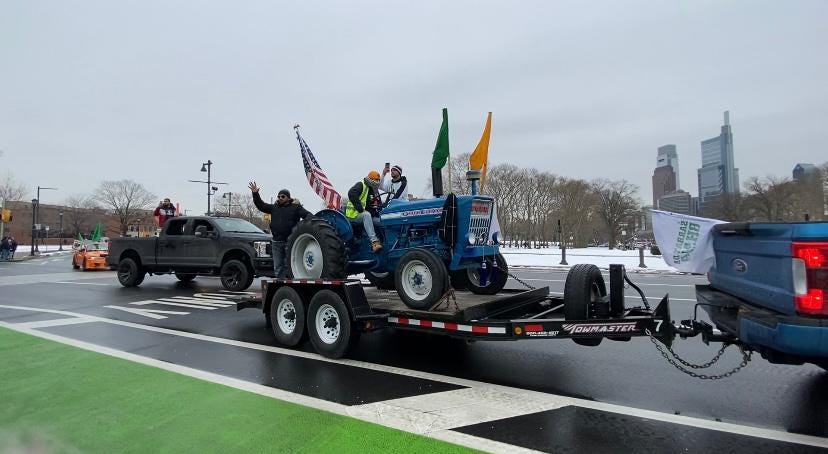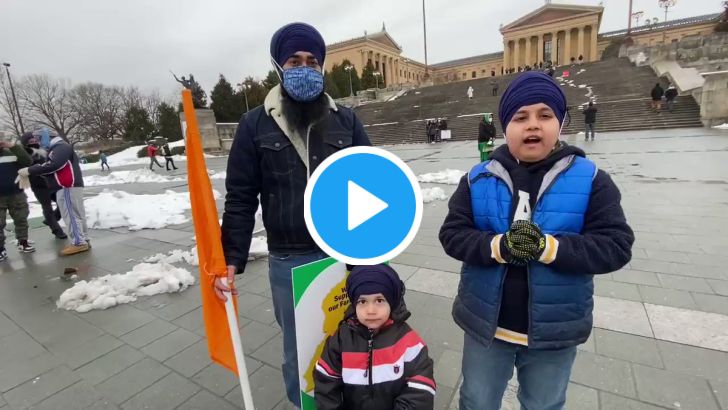Joti Kaur Rekhi: Freezing Rain Does Not Stop Philadelphia Solidarity Farmers Protest
Despite the threat of a winter storm, some attendees traveled to the Gurdwara from New Jersey and New York by a bus organized by volunteers
Joti Kaur Rekhi
February 13, 2021 | 3.5 min. read
Demonstrators from throughout the Northeastern United States braved the bitter cold in Philadelphia to stand in solidarity with farmers who have been protesting three agricultural bills hastily passed in India last Fall.
The Kisaan Car Rally was organized by the Sikhs of America and Philadelphia Sikh Society to bring attention to the months-long demonstration in India, in which farmers have created an outdoor community filled with thousands of dissidents from throughout the country.
“I’m just very thankful to be able to support this protest,” said Kirandeep Singh, whose family in India gets their main source of income from farming.
“Seeing them suffering through this, and seeing the government not doing anything about the laws that they’re really trying to force upon the farmers, is just heartbreaking,” said Singh.
He has been disheartened by the lack of media attention on one of the largest protests in history, but he says he has been doing his part in posting online about it and educating friends and co-workers.
“I think the farmer’s voices need to be heard and they’re not being given the opportunity to be heard,” said Singh. “The country mainly lives off of the farmers from all around India. For the government not to give them the opportunity to give feedback on these laws is just very, very shameful.”
Despite the threat of a winter storm, some attendees traveled to the Gurdwara from New Jersey and New York by a bus organized by volunteers. Others drove their cars, with large green flags of solidarity representing the land the farmers cultivate, along the route from the Gurdwara to the Philadelphia Art Museum.
23-year-old Amritpal Uppal traveled in with some of his friends from New Jersey.
“After years of being oppressed and after years of being told that we are nothing in that country, to bring people from New York, Delaware, New Jersey together for one cause, even if I’m able to be out here for even just half an hour, versus their months out there [in India]: I’m happy with myself to be able to stand up for them,” said Uppal.
About 150-200 people came and went, as hail and freezing rain fell. But that did not discourage them because they say the farmers in India have endured much worse. More than 100 demonstrators have died; some due to medical complications.
“I have anger certain times. Sometimes I feel bad looking at certain pictures,” said Uppal. “Seeing all of these elderly people in India going through this, the injustice, the bias, sometimes I just can’t put it into words.”
Demonstrators held signs, gave speeches, shared performances, and chanted words like, “No farmers! No food!” and “Indian government! Shame, shame!”
One of the youngest attendees was 2 ½-year-old Achraz Singh Bhalla, who was there with his 11-year-old brother, Ganeev, and their family.
Ganeev performed a kavishiri (Punjabi spoken word) written by Parminder Singh about the current issue and historic oppression of Sikhs.
Their father, Gurpreet Singh, said the Indian government took advantage of the lockdown resulting from COVID-19, by pushing legislation through without any feedback from the farmers.
Jaskirat Kaur, a junior in high school, came to the rally with her mom. She said she had goosebumps when she first heard about what was going on in India.
“I still can’t get the fact that people in India are living outside in the cold to fight for their rights. There are young kids living outside there,” said Kaur. “I just want the government to give them their rights.”
Volunteers helped keep demonstrators warm by providing gallons of hot tea, samosas, rice, and kadahi (curry) as langar. Some of the attendees, like Balkirat Kaur, have not been inside their Gurdwaras since the pandemic began and have missed the free communal meals which are lovingly prepared by volunteers there.
“It makes me so happy [seeing all these people here]. I don’t even feel cold,” said Kaur, a student at Drexel University.
Many of those who attended said if it were not for the risks associated with traveling during the COVID-19 Pandemic, they would be outside of New Delhi’s borders, shoulder-to-shoulder with relatives who have been demanding a complete repeal of the new laws.
“It’s a bit disheartening that we can’t show up for our people when they need us the most. That’s why I’m here, to support our families back home,” said Kaur. “We all keep thinking about how our families are doing in India. We’re here to support our families away from home.”
Joti Kaur Rekhi recently obtained her MSc in International Public Policy from UCL in London. Her research focused on the disappearances and extrajudicial executions that occurred in Punjab following the Sikh Genocide of 1984. Prior to returning to school, she worked as a local television reporter for five years. Advocating for others has always been at the core of her work. She remains a voice for the voiceless. You can find Joti on Twitter at @ThisIsJoti.
Baaz is home to opinions, ideas, and original reporting for the Sikh and Punjabi diaspora. Support us by subscribing. Find us on Twitter, Instagram, and Facebook at @BaazNewsOrg. If you would like to submit a written piece for consideration please email us at editor@baaznews.org.




